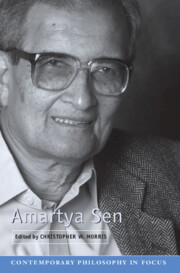Book contents
- Frontmatter
- Contents
- Contributors
- Preface
- Introduction
- 1 Preference, Choice, and Rationality
- 2 Ethics and Economics
- 3 Capability and Agency
- 4 Freedom in the Spirit of Sen
- 5 Social Choice Theory and the Informational Basis Approach
- 6 Sen on Sufficiency, Priority, and Equality
- 7 Famine, Poverty, and Property Rights
- 8 Development
- Selected Bibliography
- Index
Preface
Published online by Cambridge University Press: 05 June 2012
- Frontmatter
- Contents
- Contributors
- Preface
- Introduction
- 1 Preference, Choice, and Rationality
- 2 Ethics and Economics
- 3 Capability and Agency
- 4 Freedom in the Spirit of Sen
- 5 Social Choice Theory and the Informational Basis Approach
- 6 Sen on Sufficiency, Priority, and Equality
- 7 Famine, Poverty, and Property Rights
- 8 Development
- Selected Bibliography
- Index
Summary
The Cambridge University Press series Contemporary Philosophy in Focus, founded by my late editor Terence Moore, is meant to provide an introduction to the work of important living philosophers. The volumes in this series are to be, in good part, expository, as well as accessible to nonspecialists and to readers outside of philosophy. Terence invited me to put together a volume on the work of Amartya Sen, the 1998 Nobel laureate in economics. An economist by training, Sen is an important social and political theorist, and his work is very influential in contemporary moral and political philosophy.
My own interest in Sen's work initially was limited to social choice theory, to which I was introduced by Howard Sobel and David Gauthier while in graduate school in philosophy. In the early eighties, while a visiting assistant professor in government at the University of Texas at Austin, I sat in on Thomas Schwartz's eye-opening seminar on social choice theory and came to appreciate the importance of the field for the study of political institutions, as well as for moral theory. In the fall of 1986, I sat in on Sen's masterful (and breathless) lectures on social choice at Oxford and gained a broader appreciation of the field. Sen's critical thoughts about the theory of rational choice influenced me later. Sen's well-known studies of famine also interested me for a number of reasons, one being the revelation of an unambiguous virtue of democracy.
- Type
- Chapter
- Information
- Amartya Sen , pp. xv - xviPublisher: Cambridge University PressPrint publication year: 2009

